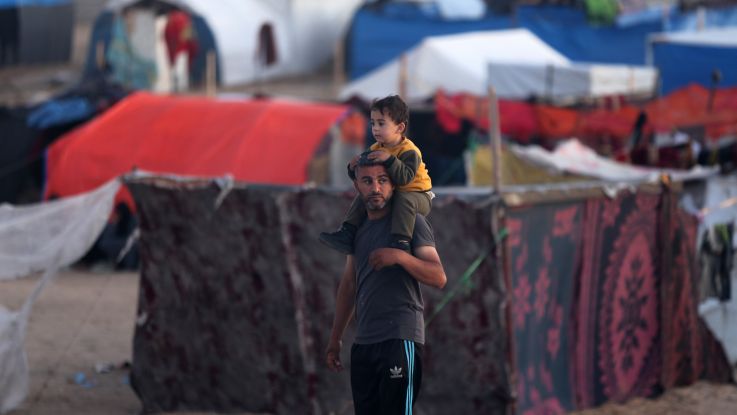Back to school: How the earthquakes are disrupting education for Syrian girls
8 September 2023
In the wake of devastating earthquakes in Syria this year, we are seeing a shocking trend of girls dropping out of school.
As children head back to school this month, we shine a spotlight on the heavy price young girls have to pay in conflict and disaster zones, the urgent need to address this issue, and why we should empower girls with the knowledge and skills they deserve.

Since the earthquake, Jumana, 11, has been unable to attend school. One day, Jumana wishes to become a doctor to help the children who were trapped under the rubble caused by the earthquake. Photo: ActionAid
Seven months after the devastating earthquakes in Syria, a new crisis is unfolding—the alarming increase in the rate of girls dropping out of school. Many girls, can no longer access their schools or any form of education in the aftermath of the earthquake.
11-year-old Jumana, an earthquake survivor in the north-west of Syria can no longer go to school. "I want to become a doctor to treat children who were trapped under the rubble because of the disaster...currently, I don't go to school because of the disaster. They stopped school hours, but I used to go before."
Today, war and disasters affect 224 million children globally, hindering their access to quality education. Out of these, 72 million children have no access to education, with over half being girls.1
These girls are 90% more likely to miss secondary school compared to those in non-crisis areas. Parents often keep girls at home due to fears of violence, which intensifies in conflict and disaster zones. With daily uncertainty, a shortage of teachers, subpar facilities, the threat of sexual violence, and overall insecurity, education takes a backseat for girls in crisis zones.
In Syria girls are facing a double crisis. Amid the harsh realities of the decade-long Syrian conflict and the recent earthquakes, girls are being forced to leave school and instead take on caretaking duties or coerced into child marriage
Why are girls in Syria dropping out of school?
According to United Nations Office for the Coordination of Humanitarian Affairs, as of August 2023, a total of 1 million children are out of school in Syria right now. And many of them are girls.2

Islam, Aseel and Rayan live in displacement camps in north-west Syria.
Persistent conflict, an escalating economic crisis, unprecedented shortages of essentials and food, and the enduring repercussions of the Covid-19 pandemic have all converged to exacerbate the effects on women and girls, with Syrian girls facing immense pressure to drop out of school as the academic year begins.
There are several factors contributing to girls leaving schools in Syria.
Extreme poverty in the displacement camps
Girls growing up in displacement camps lack access to schooling.
Even without school fees, expenses such as transportation, books, and uniforms can be too burdensome for families who are simply trying to survive in camps.
Increase in child and domestic labour
Families facing financial challenges may have to contemplate whether sending their daughters to school is worth the potential income they could earn instead or the caregiving responsibilities they could fulfill while not attending school.
Children in Syria are working at rubble removal sites, scavenging and selling scrap metal from destroyed buildings to support their families instead of attending classes.
Lack of schools in the aftermath of the earthquakes
Over a thousand school buildings suffered damages in the earthquakes, ranging from those that needed to be entirely demolished and rebuilt to those requiring restructuring and repairs. Some schools are also being used as shelters after the earthquake.
Girls living in conflict situations usually don't know what will happen on a day-to-day basis. A shortage of teachers, inadequate facilities, and overall insecurity mean that education is not considered a priority.
Forced early marriages and early pregnancy in conflict zones
In times of conflict and disasters, early and forced marriages of girls increase as parents fear for the safety of their daughters.
Recent displacements after the earthquake are compelling families to marry their daughters off at a young age due to perceived safety concerns and economic hardships. This places young girls at risk of enduring early motherhood, denial of educational opportunities, and increased vulnerability to abuse.3 Our partners have reported instances of families depriving some girls of food to pressure them into marriage.
Girls who experience early pregnancy face elevated risks, including serious pregnancy and postpartum infections, bodily trauma, and early sexual activity can increase the risk of cervical cancer. There is also a heightened risk of intimate partner violence, abuse, and family conflict, especially when the primary purpose of the marriage is childbearing.
Why is education important during and after times of crises?
It's crucial not to overlook the significance of education during conflicts and crises. Education serves as a tool for upholding human rights, actively promoting peace, enhancing security, and acting as a preventative measure against future conflicts.
As we know, educated girls contribute to the betterment of society as parents, workers, neighbours, and citizens. They elevate the standard of living for themselves, their families, communities, and nations.
Education equips them with essential social and emotional skills, enabling them to engage effectively with the world. It offers them vital tools to navigate life's various stages and adapt to diverse situations. It fosters critical thinking and, most importantly, empowers them to make informed choices about their lives and take control of their futures.
Around the world, conflicts and disasters are disrupting the dreams and aspirations of countless children, but the crisis in Syria remains one of the world's most dire and protracted humanitarian emergencies.
ActionAid’s wider work in north-west Syria
For the last seven months, ActionAid has been working with local partners in Syria to provide emergency and long-term care for those affected by the earthquakes.
This has included shelter, food, medical aid, sanitation, warm clothing, heaters and cash transfers for thousands of people, in partnership with organisations.
Partners have also been carrying out counselling and events like puppet shows and playtime for children in the region - many of whom have suffered severe trauma - and setting up safe spaces for women and girls, in order to prevent and respond to cases of gender-based violence.
Overall our response reached more than 100,000 people.
But as this ‘crisis within a crisis’ continues to develop, we need your help more than ever.
Please consider giving a £20 donation today, which could provide a family with a food kit including canned goods, oil and water.
Footnotes
- 1https://www.gov.uk/government/publications/uk-government-support-for-girls-education-worldwide/education-in-emergencies#fn:1
- 2file:///Users/arsheen/Downloads/Northwest_Syria_Key_Figures_Factsheet_20230817.pdf
- 3https://arabstates.unfpa.org/en/publications/overview-gender-based-violence-syria-advocacy-brief-2023



